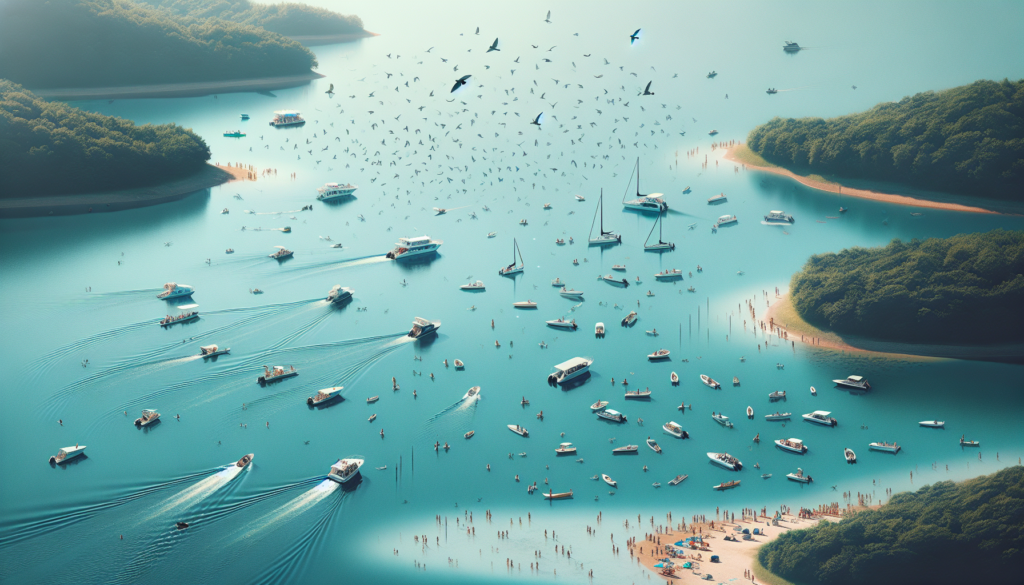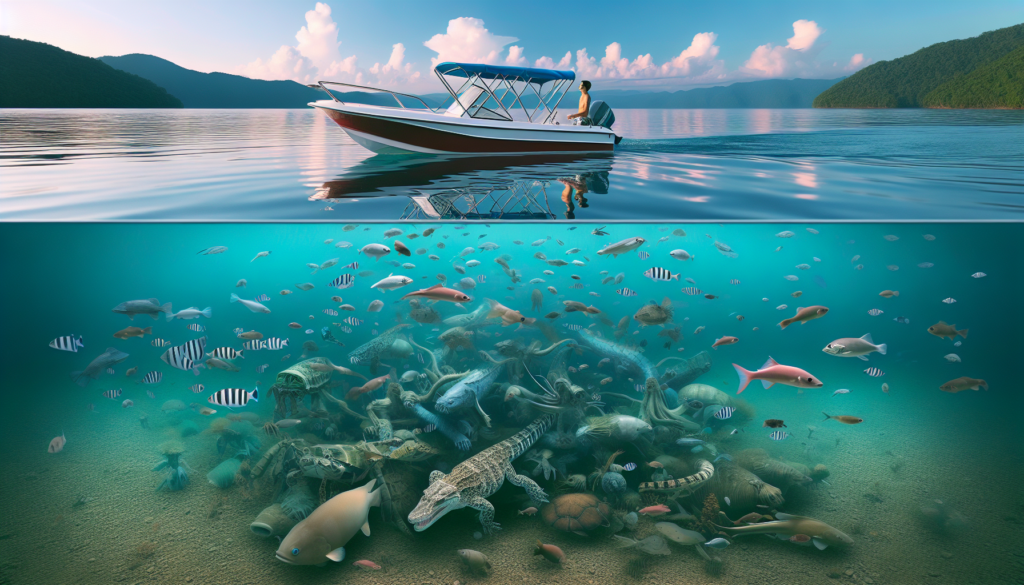Unfolding nature’s splendor aboard a boat is an enriching experience everyone should savor, but we have a responsibility to do so without disturbing our precious wildlife and their habitats. “Balancing Wins and Wildlife: Navigating Protected Waters While Boating” is your guide to achieving this harmony. This article offers insights into the delicate act of boating respectfully and responsibly, particularly in protected locales abound with diverse species of flora and fauna. Get ready to set sail with a renewed perspective, ensuring your recreational pursuits leave a positive ripple effect rather than a destructive wake.

Understanding Protected Waters
Navigating through protected waters is a delight for any boating enthusiast. But before you set off on your next nautical adventure, let’s get a better understanding of what protected waters really are.
Definition of protected waters
Protected waters, also known as marine protected areas, are designated regions of seas, oceans, estuaries, or large lakes. These areas have restrictions to human activity in order to protect the living, non-living, cultural, and/or historic resources within.
Importance of protected waters
Why should you care about protected waters? For one, they help conserve biodiversity by providing a safe habitat for marine species. They also protect important ecosystems that regulate climate, filter pollutants, and mitigate natural disasters. Lastly, they serve as living laboratories for scientists to conduct research and for the public to learn about marine nature.
Marine wildlife in protected waters
In protected waters, you’ll find a diverse array of marine wildlife. This could include various species of fish, shellfish, seabirds, and marine mammals such as seals, whales, and dolphins. Many of the species present in protected waters are threatened or endangered, making their preservation crucial.
Laws and Regulations for Boating in Protected Waters
It’s critical that you uphold the laws and regulations when boating in protected waters. Let’s take a look at them in detail.
Federal laws for boating
In the United States, federal laws for boating are set by entities such as the U.S. Coast Guard and the Federal Maritime Commission. These include rules regarding boat safety, pollution prevention, and protected species.
Local laws for boating in protected waters
Local laws for boating in protected waters vary drastically depending on the location, so you’ll need to do your due diligence prior to setting sail. Some might have limitations on the types of boats allowed, others might have designated routes, and some may even ban any human activity altogether.
Penalties for non-compliance with boating laws
Not complying with boating laws could land you with hefty fines, prison sentences, or both. It’s not just about the authorities though – showing disregard for these rules can cause significant harm to the habitat and species the protected waters are trying to safeguard.

Best Practices for Boating in Protected Waters
Boating conscientiously in protected waters boils down to a few best practices.
Responsible boating behaviors
Some actions you can take include avoiding sensitive areas during breeding seasons, abiding by all signage, and taking care not to disturb marine life with your activities.
Safe speeds for boating
Maintain slower boat speeds, especially in no-wake zones. High boat speeds can cause collisions with wildlife, not to mention the wake can significantly impact shoreline erosion.
Proper waste disposal while boating
Make sure you do not litter the waterways. Dispose of waste in designated areas onshore and never dump oil, fuel, or other hazardous materials overboard.
Equipment for Safe Boating in Protected Waters
Equip your boat properly to ensure safety and a minimal impact on the environment.
Navigation devices
GPS systems, navigation charts, and compasses are essential tools for sailing in protected waters. They will help you stay on designated paths and away from sensitive areas.
Safety equipment
Lifejackets, fire extinguishers, distress signals, and first aid kits are some of the mandatory safety equipment you should carry onboard. Ensuring safety for yourself and your passengers should always be your top priority.
Wildlife-friendly boating accessories
Consider buying special propellers that minimize harm to marine wildlife or noise-reducing devices that lessen the disturbance to sensitive creatures.

Avoiding and Minimizing Impact on Wildlife
Keeping a keen eye for wildlife and respecting their needs is the crux of responsible boating.
Recognizing signs of marine wildlife
Look out for signs like diving birds or surfacing dolphins. Knowing how to spot wildlife will enable you to maintain a safe distance and avoid startling them.
Minimizing noise pollution
Marine wildlife is acutely sensitive to sound. So, keep engine noise to a minimum and avoid loud music or unnecessary noise that could disturb them.
Maintaining safe distances from wildlife
Regardless of how captivating an encounter with marine wildlife might be, remember to maintain safe distances. Never attempt to feed or touch wildlife.
Respecting Wildlife During Water Activities
Even when indulging in recreational activities, it’s crucial to respect wildlife.
Guidelines for fishing
Follow the fishing regulations to avoid catching restricted species. Use gear that minimizes the risk of entanglement.
Guidelines for water sports
Water sports like jet-skiing, paddle boarding, and swimming should all be conducted in a way that respects the wildlife and habitat.
Guidelines for wildlife viewing
View animals from a distance using binoculars or zoom lenses. Never chase wildlife for a closer look.

Dealing With Unexpected Wildlife Interactions
It’s inevitable to encounter wildlife in protected waters, but how you handle it is vital.
Reacting to wildlife encounters
Do not panic or react hastily during a wildlife encounter. Instead, slow your boat and watch from a safe distance.
Reporting injured or distressed wildlife
If you come across injured or distressed wildlife, alert the local wildlife rescue center. Never try to handle troubled wildlife on your own.
What to do if you accidentally harm wildlife
In an unfortunate event that you harm wildlife, report the incident to local conservation officials, who will manage the situation appropriately.
Understanding the Impact of Boating on Marine Ecosystems
Boating, while enjoyable, can also negatively impact marine ecosystems.
Erosion caused by boating
Wave action from boats can cause erosion of shorelines, damaging habitats and causing loss of land.
Pollution caused by boating
Noise, air, and water pollution from boating activities can stress marine wildlife and degrade their habitat.
Disturbance to wildlife
Boating can disturb wildlife, interfering with their feeding, nesting, and mating behaviors.
Involvement in Conservation Efforts
As a boater, you’re in a unique position to support conservation efforts.
Volunteering for conservation organizations
There are many organizations that protect marine life and could use your help. You can volunteer your time or donate funds.
Supporting marine protected areas
Support marine protected areas by advocating for their creation and endorsing existing ones.
Advocacy for responsible boating laws and regulations
Pushing for stricter boating laws in your local community can immensely help in marine conservation efforts.
Benefits and Rewards of Responsible Boating
Experiencing the miraculous marine life while indulging in your favorite pastime is reward enough, but responsible boating offers even more benefits.
Contributing to wildlife preservation
By boating responsibly, you help conserve biodiversity and ensure marine species thrive for generations to come.
Enhancing boating experiences
With responsible practices, you ensure that your favorite spots continue to exist and provide joy to other enthusiasts like yourself.
Developing a deeper respect and appreciation for nature
The more you understand and respect nature, the deeper your appreciation becomes.
So, as you venture into the exciting realm of boating in protected waters, remember that every conscious action taken, from speed adjustment to waste management, has a profound impact. Your responsible boating will contribute significantly to preserving the unique ecosystems for the future. Happy boating!

